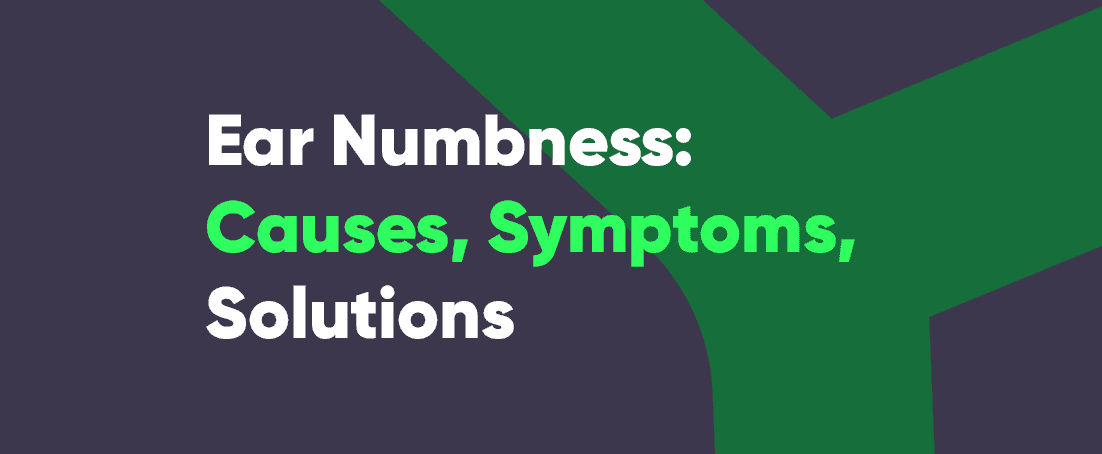
Ear numbness, or paresthesia, is a common yet rarely talked about health concern. It manifests as a tingling sensation, causing not just discomfort but also potential health risks. The ears are particularly susceptible to this condition due to their complex nerve network and exposure to environmental factors.
When ear numbness strikes, it significantly diminishes one’s quality of life as it’s harder to chew and your hearing may diminish. This condition stems from a variety of causes, has diverse symptoms, and fortunately, can be addressed through numerous solutions. This article is all about tingling.
Ears Tingling (Numbness) Meaning
Ear numbness, often experienced as a prickling or tingling sensation, signifies an interruption in the normal functioning of the sensory ear nerves. Tingling occurs when nerve communication is hindered, either due to compression, damage, or a temporary lack of blood flow. This sensation acts as a warning signal, alerting us to potential harm or malfunction in the body.
Unlike numbness in limbs, which might stem from simple causes like pressure, ear numbness often indicates more complex issues due to the ear’s intricate nerve structure. Understanding this distinction is crucial in recognizing the seriousness of ear numbness and seeking appropriate intervention.
Causes of Ear Numbness
Some causes of ear numbness may be linked to past events, which makes it harder to locate them. A comprehensive look into patients’ health history is needed in many cases. It’s a good idea to look into the causes no matter if you are planning to consult a doctor or treat the ear numbness yourself.
Nerve Compression
Nerve compression, particularly in the cranial nerves, can lead to ear numbness. This happens when surrounding tissues exert undue pressure on the nerves. It’s a relatively common issue, often resulting from injury or repetitive movements. An individual might feel a gradual onset of tingling, progressing to more persistent numbness.
Ear infection
The spread of ear infections, especially in the middle ear, can cause numbness. Infections inflame the ear’s structures, affecting nerve function. They are frequent in both children and adults and can range from mild to severe. An infection in the ear canal can often include a sudden, sharp pain followed by a dull, numb ear sensation.
Earwax Blockage
Excessive earwax can press against the ear canal’s nerves, leading to a tingling sensation. It’s a common issue, easily remedied but often overlooked. One might experience a gradual loss of sound sensations, accompanied by decreased peripheral hearing. It’s the result of wax forming blocages in the middle ear.
Swimmer’s Ear
Swimmer’s Ear, or external otitis, is an infection of the ear canal often caused by water retention. This condition irritates and swells the canal, affecting nerve endings. It’s common in swimmers but can affect anyone. Symptoms start from itching ears and then progress to numbness.
Diabetes
Diabetes can lead to peripheral neuropathy, affecting nerves in the ears. High blood sugar levels damage nerves over time. This cause is ]severe due to its systemic nature and frequent occurrence among diabetics. Symptoms often start as intermittent tingling before becoming constant.
Sleeping Position
An incorrect sleeping position can compress ear nerves temporarily. This cause is less severe and quite common. Individuals often wake up with a tingling sensation that resolves upon changing position or after some time.
Dental Procedures
Dental procedures, particularly those involving the lower jaw, can inadvertently affect nerves and create ear ache. This cause is less common but symptoms are noteworthy. Numbness and pain occurs after the dental procedure, usually subsiding within hours to days.
Blood Circulation Issues
Poor blood circulation, due to various health conditions, such as obesity or eustachian tube dysfunction, can affect ear nerve function. This issue is serious and requires medical attention. Symptoms might include a cold sensation in the ear, followed by numbness ear.
Symptoms and Associated Discomfort Related to Tingling In The Ear
Ear numbness often comes with various accompanying symptoms, each pointing towards different underlying causes. The tingling sensation can be just the tip of the iceberg in terms of discomfort and signs, so it’s important to notice them on time.
- Dizziness: A common accompaniment, indicating potential nerve or balance issues.
- Earwax Buildup: Excessive earwax can lead to a feeling of fullness alongside numbness. Earwax color changes are also possible if the tingling is caused by the ear infection.
- Hearing Loss: Partial or complete hearing loss often accompanies prolonged numbness.
- Ringing in the Ears (Tinnitus): A persistent ringing or buzzing sound sometimes occurrs with numbness.
- Inflammation: Swelling or redness in the ear often indicates an infection or irritation.
- Loss of Balance: Often associated with conditions ranging from a commonplace ear infection to Meniere’s disease, indicating inner ear issues.
- Pain: Can range from mild to severe, often accompanying infections or other ear conditions.
Does Ear Numbness Require Treatment?
Consult a doctor if you experience persistent numbness lasting more than a few days, numbness accompanied by severe pain, dizziness, or if there’s a sudden loss of hearing. These symptoms may signal more serious underlying conditions.
You can still try several remedies at home. Applying warm compresses can improve blood circulation, potentially alleviating numbness. Massaging the area around the ear and neck can also relieve tension. However, gently cleaning the outer ear to remove any excess earwax with one of the top-rated ear wax removals is the first thing to try.
In a clinic, a doctor might perform many of the same remedies. However, they are also qualified to perform hearing tests, examine ear blockages or infections, and prescribe medication if necessary. Timely and appropriate medical intervention is essential for addressing the root cause of ear numbness.
Prevention Strategies for Ear Numbness
Preventing ear numbness effectively involves understanding its causes and adopting suitable strategies. Here are four methods:
Changing Sleeping Positions. Identify and avoid positions that put pressure on your ears. Often, poor neck alignment is caused by bad pillows or firm matresess, so consider investing into them. It’s also a good idea to regularly even out the pressure by alternating sleeping sides and positions.
Warm Compresses. Apply a warm compress to your ears for 10-15 minutes daily to enhance blood circulation. Be cautious of the temperature of the compress as too hot compress might even cause burns.
Ear Hygiene. This one should be a no brainer. Cleaning your ears gently to prevent wax buildup should be a weekly routine. To avoid more damage, you should avoid inserting foreign objects like cotton swabs deep into the ear canal. My Twidler in-depth review argues that it is the best tool for avoiding ear damage when cleaning numb ears.
Avoiding Loud Noises. Eardrum damage from sounds and the tingling feeling it creates isn’t often for everyone. But regardless of whether you are exposed to noises, limiting loud sounds or, at least, using ear protection in loud places is crucial for middle ear health. The same applies to limiting the sound of your headphones as it can also lead to ear tingling or even pain.
Final Thoughts on the Tingling Sensation
Ear tingling might seem a minor issue, but it can be a sign of serious ear problems. Persistent or severe cases require professional medical evaluation. Prevention practices, like avoiding loud noises and maintaining ear hygiene, are essential. If you have ever experiencing tingling, be sure to remember the tips laid out here.



